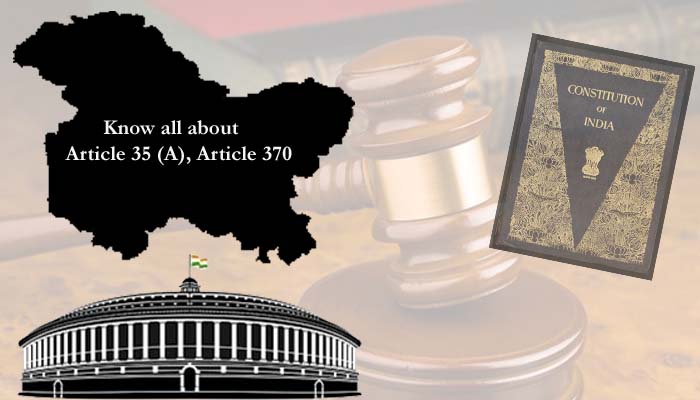TRENDING TAGS :
Know what Article 35A, Article 370 is and what its removal means!
Deployment of high security and the house arrest of top leaders of the state had given air to speculation of BJP's move to repeal Jammu and Kashmir's special status. And on August 05, Home Minister, Amit Shah proposed to abrogate article 370, a temporary provision in Indian Constitution which later became a permanent feature of the constitution after the State's constituent assembly dissolved itself on January 25, 1957 without recommending either abrogation or amendment of the article.
New Delhi: The article which had given Jammu and Kashmir, a special status by Indian Constitution, has now been scrapped down by BJP government in Rajya Sabha, bifurcating the state into two Union territories.
Deployment of high security and the house arrest of top leaders of the state had given air to speculation of BJP's move to repeal Jammu and Kashmir's special status. And on August 05, Home Minister, Amit Shah proposed to abrogate article 370, a temporary provision in Indian Constitution which later became a permanent feature of the constitution after the State's constituent assembly dissolved itself on January 25, 1957 without recommending either abrogation or amendment of the article.
ALSO READ: #KashmirParFinalFight LIVE: Article 370 revoked; Modi to address nation
To get the hold of the situation and what is going on in the valley and political sphere is it important to know what are these articles and how they are going to change the face of Jammu and Kashmir's politics:
What is Article 35 A
Conferring special rights and privileges upon the citizens of Jammu and Kashmir, Article 35 (A) was incorporated in the Constitution by a 1954 Presidential order. It also prohibits non-residents of Jammu and Kashmir from buying/purchasing any immovable property in the state.
-The Article 35 (A) empowered the state authorises to define "permanent residents" of J&K and provide them with notable benefits with regard to immovable property, settlement in the state and employment.
-Meanwhile, Article 35 (A) extends fundamental rights of the Indian constitution to the state.
-Financial relations between the Centre and the State were same as for the other States. The State's custom duties were abolished.
-However, the State Legislature was empowered to legislate on preventive detention for the purpose of internal security, while, the jurisdiction of the Supreme Court of India was extended to the State.
-In the event of external aggression, Central Government was given power to declare national emergency in the state. However, in times of internal disturbances the power could be exercised only with the concurrence of the State Government.
ALSO READ: SC to decide on Friday on shifting Unnao rape survivor to Delhi
What is Article 370
Giving state's legislator special powers to legislate laws and its residents a separate set of laws, Article 370 gives Jammu and Kashmir special status related to citizenship, ownership of property, and fundamental rights, as compared to other Indians.
As per this article, except for defence, foreign affairs, finance and communications, Parliament needs the state government's concurrence for applying all other laws.
It was introduced in the Constitution on October 17, 1949.
Article 370 of the Constitution granted special status to Jammu and Kashmir whereby provisions of the Constitution which were applicable to other states were not applicable to J&K.
It is to be mentioned that Jammu and Kashmir wasn't the only state to enjoy such status under Indian Constitution, but many tribal areas of India, including those in Himachal Pradesh, Arunachal Pradesh, Andaman & Nicobar Islands and Nagaland also come under this unique arrangement. However, it is only in the case of Jammu and Kashmir that India and Pakistan, stake their claim to the state and its accession to India is still a matter of dispute. Meanwhile, the matter of J-K is still on the agenda of the UN Security Council, where the Government of India, in 1974 Indira-Sheikh accord, committed itself to keep the relationship between the Union and J-K within the bounds of this Article.
ALSO READ: Mumbai: 8,500 people from Diva shifted as Barvi dam overflows



